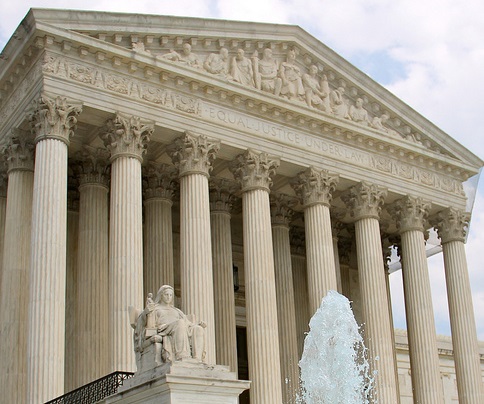Supreme Court Denies Same-Day Audio Request

The smarter way to stay on top of broadcasting and cable industry. Sign up below
You are now subscribed
Your newsletter sign-up was successful
The Supreme Court has denied a petition to release same-day audio of a couple of upcoming oral arguments.
On Jan. 18, the court will hear arguments in Lee v. Tam, which deals with an Asian rock band, The Slants, and whether its name, a recognized slur, can be trademarked. The other case Fix the Court wants audio from is Ashcroft v. Abbasi, about post-Sept. 11 detentions.
Neither will get same-day treatment.
"The Court will follow its usual practices regarding the posting of the oral argument audio for Lee v. Tam and Ashcroft v. Abbasi , Ziglar v. Abbasi and Hasty v. Abbasi, consolidated, scheduled to be heard on January 18," Supreme Court public information officer Kathleen Argerg said in an email to Fix the Court Friday (Jan. 6). "The transcripts of the oral arguments will be available on the Court’s website on the same day the arguments are heard, and the audio recordings will be available on the website at the end of the argument week."
Fix the Court (FTC), a group dedicated to greater access to Supreme Court arguments, had delivered a petition seeking same-day audio.
The D.C. Federal Appeals Court is currently considering the Redskins case, and could look to the Lee. V. Tam case for direction.
Fix the Court says it delivered almost 1,000 petitions from people in all 50 states.
The smarter way to stay on top of broadcasting and cable industry. Sign up below
The group points out that the Supreme Court is one of only three federal courts not to routinely release same-day audio, the others being the Tenth and Eleventh Circuits, though it says the latter has indicated it will start posting same-day audio later this year.
"Both of the Jan. 18 cases have implications outside of D.C. The rock band The Slants, who are the respondents in the first case, are from the other side of the country, and many of the detained individuals who are respondents in the second case hail from all over the world," said FTC executive director Gabe Roth. "But it's not only that - and remember, it's not like we're not trying to listen in on their conference when they cast votes. What's so frustrating is that a government institution that has the technology - which costs them nothing, by the way - to be more transparent but refuses to do so is simply obnoxious. I wish I could think of a better word, but there isn't one."
Contributing editor John Eggerton has been an editor and/or writer on media regulation, legislation and policy for over four decades, including covering the FCC, FTC, Congress, the major media trade associations, and the federal courts. In addition to Multichannel News and Broadcasting + Cable, his work has appeared in Radio World, TV Technology, TV Fax, This Week in Consumer Electronics, Variety and the Encyclopedia Britannica.

